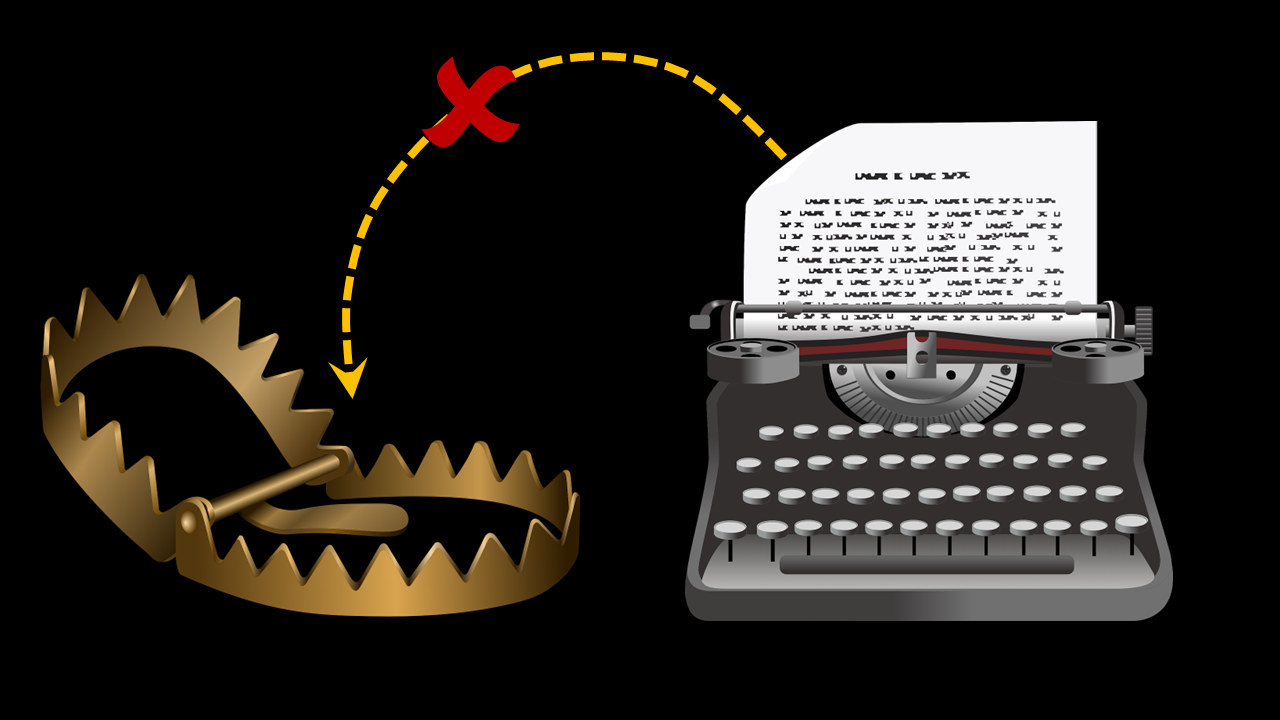When you see several potential verbs in a short sentence, but only one of them ends with -ing—and it isn’t driving the action—your sentence may have fallen into the Gerund Trap. If the -ing word represents an abstract idea and it’s the first word in a sentence or independent clause, then you’re almost certainly in the Gerund Trap. You may be surprised to learn that your -ing word isn’t functioning as a verb at all: it’s a noun! (By definition, a gerund is a verb in its -ing form that functions as a noun.)
This sentence style is a trap for many writers because the gerund’s unique function allows it to attract extra words as part of a noun phrase without becoming ungrammatical. Then it hides from your editing eye because the -ing word feels like it should be verb. It escapes your red pen. And, even when it doesn’t escape notice, most writers can’t imagine the fix. You’re now in the Gerund Trap.
If you can spot these sneaky nouns pretending to be present tense verbs (or present participles), then you can tighten your sentences, improve pace, and increase punch. Newly released WordRake 4.3 can help you make these tricky changes. Here’s how to understand these editing suggestions and how to spot them on your own.
What Is the Gerund Trap?
The Gerund Trap is the use of an unnecessary gerund as the subject of the sentence when the direct object of the gerund could be the subject alone.
Before you balk at all the grammar terms and stop reading, consider these simple examples:
Maintaining the company webpage is one of the assistant’s main duties.
Patients with untreatable but hard-to-diagnose diseases often feel better with a diagnosis; they say that having answers alone can be a huge relief.
Participating in the conference inspired me to try a new field of research.
Some social scientists say that marriage helps society because engaging in traditional social roles reduces men’s aggression.
Implementing new recycling initiatives reduced trash production in the town.
What Is a Gerund—and Why Is It Special?
Because gerunds have verb origins, they get special functionality. Even though gerunds are acting as nouns, they can take direct objects. And that’s the problem. In many cases, a gerund with a direct object is unnecessary in a sentence. The direct object itself is often the more important information, so adding the gerund just increases character count without improving clarity.
An Aside on the Gerund Terminology
Among English experts, some schools of thought use the word gerund to refer to ALL -ing words, whether they’re nouns from verbs (the type of gerund relevant to this article), nouns that have NO verb properties (as in The child’s drawing is cute), or participles that follow be, like in the sentence He is running. In most schools of thought, running in that sentence is not a gerund but a verb showing the progressive aspect of the present tense. This article discusses gerunds—verbs functioning as nouns.
When Gerunds Are Helpful
Though gerunds with direct objects are frequently pointless, sometimes they’re useful. Many verbs (and their gerund forms) provide information that changes the meaning of the sentence, such as here:
Failing the test will result in the student’s inability to graduate.
The teacher was glad to start a new phase of life; retiring from her job gave her more free time.
Leaving the loud party helped Bob relax.
When Gerunds Are Useless
To check your writing for the use of unnecessary gerunds, search your document for any words ending in -ing and decide whether each one is a gerund that can be deleted to make the sentence stronger. To help you decide, ask these three questions to see if your verb-turned-gerund is too abstract:
1. Can I physically imagine someone doing this verb?
If not, it may be abstract and therefore harder to understand. (Compare your ability to imagine walking vs. enhancing.)
2. Does this verb have more than one commonly used meaning?
If so, it may be misunderstood. (Promoting can mean “giving someone a raise,” “selling or encouraging the use of,” or “helping something improve.”)
3. Is this verb similar to its French or Latin translation?
For historical reasons, more recent French and Latin cognates used in English are notoriously more abstract than their Germanic synonyms (think assist vs. help, attain vs. meet, and confirm vs. make sure).
When gerunds are formed from verbs that are already too general or abstract, the extra word does nothing more than complicate your noun phrase. (Education researchers often point out that the more complex a passage’s noun phrases are, the less likely readers will understand the passage.)
Rescuing Sentences from the Gerund Trap
Let’s return to our original example sentences. Notice that all of the blue italicized words above —the gerunds— are the subjects of the sentences (or of independent clauses within the sentences).
Now consider these same sentences without the gerunds:
Maintaining the company webpage is one of the assistant's main duties.
Patients with untreatable but hard-to-diagnose diseases often feel better with a diagnosis; they say that having answers alone can be a huge relief.
Participating in the conference inspired me to try a new field of research.
Some social scientists say that marriage helps society because engaging in traditional social roles reduces men’s aggression.
Implementing new recycling initiatives reduced trash production in the town.
When the gerunds’ direct objects become the subjects, these sentences improve. They become clearer and more concrete.
Efficiently Removing Unnecessary Gerunds
If you want to streamline your writing without struggling through a mentally taxing multi-part test every time you encounter a gerund, try WordRake. WordRake will efficiently identify unnecessary gerunds and suggest appropriate replacements with one click. And if your direct object is in the plural, WordRake’s got you covered! The software fixes any resulting subject-verb disagreement:
Conducting Project meetings improves not only team efficiency, but also team morale. Researchers believe these improvements are due to increased accountability and transparency.
It’s the age of digital advertising; implementing digital marketing strategies spreads your company’s reach.
Child psychologists encourage family meals because having regular family meals fosters stronger bonds.
Don’t stop by cutting useless gerunds, cut other writing clutter, such as throat-clearing introductory phrases, wind-downs that weaken sentences, unnecessary descriptive words and modifiers, adjective phrases, and nominalizations. WordRake’s editing software is trusted by smart professionals who know the value of great writing. See for yourself! Start your 7-day free trial today.
About the Authors
Ivy B. Grey is the Chief Strategy & Growth Officer for WordRake. Before joining the team, she practiced bankruptcy law for ten years. In 2020, Ivy was recognized as an Influential Woman in Legal Tech by ILTA. She has also been recognized as a Fastcase 50 Honoree and included in the Women of Legal Tech list by the ABA Legal Technology Resource Center. Follow Ivy on Twitter @IvyBGrey or connect with her on LinkedIn.
Danielle Cosimo is a Language Usage Analyst for WordRake. Before joining the team, she was a translator and editor for non-native English speakers applying to degree programs in the United States and the UK. Danielle is formally trained in linguistics and has a certificate in computer programming. She is fluent in English, Portuguese, and Spanish. She applies her interdisciplinary knowledge to create WordRake’s editing algorithms.








